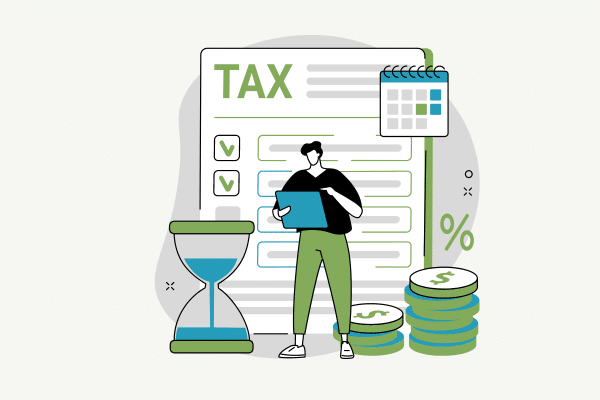
Table of Contents
Intro: Tax-Saving Tips for Freelancers and Self-Employed Professionals
Tax-Saving Tips for Freelancers and Self-Employed Professionals: Freelancing and self-employment offer incredible freedom, flexibility, and the opportunity to be your own boss. But with that independence comes a unique set of financial responsibilities—especially when it comes to taxes. Unlike traditional employees, freelancers don’t have taxes automatically withheld from their income. That means you’re not only responsible for reporting your earnings but also for finding smart ways to reduce your tax bill.
If you’re looking to keep more of your hard-earned money, this guide will walk you through proven tax-saving strategies tailored for freelancers and self-employed professionals. Whether you’re just starting out or have been running your business for years, these tips can make a real difference.
1. Understand Your Tax Obligations
Before diving into savings strategies, it’s important to understand your responsibilities.
Self-Employment Tax
In most countries, freelancers are responsible for paying self-employment tax, which includes Social Security and Medicare. This is in addition to income tax. In the U.S., for instance, self-employment tax is 15.3% as of 2025. That means you’re paying both the employee and employer portion.
Quarterly Estimated Payments
Freelancers often need to pay taxes quarterly instead of annually. These estimated payments are based on what you expect to earn throughout the year.
Keeping Accurate Records
Keeping detailed records is crucial. It helps you claim deductions, avoid penalties, and stay organized come tax time.
2. Track Every Business Expense
One of the best ways to lower your taxable income is by deducting legitimate business expenses. If it’s ordinary and necessary for your work, it’s likely deductible.
Common Deductions Include:
- Home Office – A portion of your rent or mortgage, utilities, and repairs if you have a dedicated workspace at home.
- Internet and Phone Bills – You can deduct the percentage used for business.
- Office Supplies – Notebooks, printer ink, pens, and other essentials.
- Software and Subscriptions – Tools like design software, CRMs, and cloud storage.
- Professional Services – Legal or accounting help, consultants, or virtual assistants.
- Marketing and Advertising – Website hosting, business cards, social media ads.
- Travel and Meals – Business-related travel expenses, including transportation, lodging, and meals.
Make it a habit to save receipts and track your expenses regularly, either through a spreadsheet or accounting software like QuickBooks or FreshBooks.

3. Take Advantage of the Home Office Deduction
If you work from home, you may be eligible for the home office deduction. This is one of the most misunderstood yet powerful tax-saving tools.
Key Rules:
- The space must be used regularly and exclusively for business.
- It can be a separate room or just a dedicated portion of a room.
You can calculate the deduction using two methods:
- Simplified Method: $5 per square foot, up to 300 square feet.
- Regular Method: Deduct actual expenses based on the percentage of your home used for business.
This can save you hundreds—sometimes even thousands—of dollars annually.
4. Deduct Health Insurance Premiums
Freelancers often pay out-of-pocket for health insurance, but the good news is that premiums may be deductible.
If you’re self-employed and not eligible for employer-sponsored health coverage (such as through a spouse), you can generally deduct your health, dental, and qualified long-term care insurance premiums. This applies even if you don’t itemize deductions.

5. Use Retirement Plans to Your Advantage
Saving for retirement not only helps secure your future but also provides substantial tax benefits today.
Options for Freelancers:
- SEP IRA (Simplified Employee Pension): Contribute up to 25% of your net earnings, with a cap (over $60,000 in many years).
- Solo 401(k): Lets you contribute both as the employer and employee. This can result in very high contribution limits.
- Traditional IRA: Up to $6,500 per year (as of 2025), or $7,500 if you’re 50 or older.
Contributions to these plans reduce your taxable income, helping you pay less in taxes now while preparing for retirement.
6. Depreciate Equipment and Assets
If you’ve bought a new laptop, camera, or vehicle for business, you may be able to deduct the cost through depreciation.
Section 179 Deduction (U.S. Specific):
Instead of depreciating over several years, you can deduct the full cost in the year of purchase. This applies to qualifying business equipment and software.
Bonus Depreciation:
This allows for even more accelerated write-offs in the year assets are put to use.
Talk to a tax professional to determine which method works best for your situation.

7. Open a Separate Business Bank Account
It might not seem like a direct tax-saving tip, but keeping your business and personal finances separate can protect you in an audit and make tax filing much easier.
With a dedicated business account, it’s easier to:
- Track income and expenses
- Avoid commingling funds
- Maintain clear, professional financial records
This can help ensure you don’t miss deductions and can quickly resolve any issues with tax authorities.
8. Hire a Tax Professional
Taxes for freelancers can get complicated quickly. A qualified CPA or tax advisor who understands self-employment can often save you far more than their fee.
They can:
- Identify deductions you might miss
- Help with quarterly payments
- Assist in forming a legal business structure (LLC, S-Corp) for tax advantages
- Ensure compliance and reduce audit risk
Consider it an investment, not an expense.
9. Consider Business Structures for Tax Efficiency
As a freelancer or sole proprietor, you’re taxed on all net earnings. But forming an LLC or electing to be taxed as an S-Corp may provide savings.
LLC Benefits:
- Limited liability protection
- Pass-through taxation (no double tax)
S-Corp Benefits:
- Ability to pay yourself a reasonable salary and take remaining profits as distributions
- Distributions are not subject to self-employment tax, which can lead to savings
These structures come with extra paperwork and requirements, so it’s essential to consult a tax advisor before making changes.
10. Keep Up with Tax Law Changes
Tax laws can change every year, especially those affecting freelancers and small businesses. Staying informed ensures you’re not missing out on new deductions or credits.
For example, temporary deductions may be offered for equipment purchases, meals, or pandemic-related relief. Staying current helps you take advantage of these opportunities.
Subscribe to official newsletters or follow reputable tax professionals who share updates tailored to freelancers.
11. Claim the Qualified Business Income (QBI) Deduction
The QBI deduction, also known as the 20% pass-through deduction, allows eligible self-employed individuals to deduct up to 20% of their qualified business income.
This can result in significant tax savings, but eligibility depends on your income level, business type, and filing status. Certain high-earning professionals (like consultants or designers) may face phase-outs.
It’s a complex area, so talk to a tax expert to determine if you qualify.
12. Don’t Forget Education and Training
Courses, certifications, books, or conferences that help you improve your skills or grow your business are typically deductible.
Investing in yourself not only helps your career but can reduce your tax liability.
Just make sure the education is directly related to your business or profession, not a completely new career path.
13. Maximize Business Meal Deductions
While entertainment expenses aren’t deductible, business meals still are—often up to 50%.
To qualify:
- The meal must be business-related.
- You must be present.
- The expense must be documented (who, what, where, why).
Keep detailed notes and receipts for each meal to back up your claim if needed.
14. Don’t Overlook Mileage and Vehicle Use
If you use your personal vehicle for business, you can deduct expenses in one of two ways:
- Standard Mileage Rate: Track your business miles and multiply by the IRS rate (updated yearly).
- Actual Expenses: Deduct a portion of fuel, maintenance, insurance, and depreciation.
Apps like MileIQ or Everlance can help you automatically track mileage, making this deduction much easier to claim.
15. Keep an Emergency Tax Fund
Set aside a portion of your income (often 25-30%) into a separate savings account for taxes. This helps you avoid penalties, stress, or scrambling when quarterly payments are due.
Having a dedicated tax savings buffer is one of the smartest financial habits a freelancer can develop.
Conclusion: Be Proactive, Not Reactive
Paying taxes is inevitable—but overpaying isn’t. As a freelancer or self-employed professional, you have access to a wide range of deductions and tax strategies that employees simply don’t.
The key is to be proactive. Keep good records, stay educated, and don’t hesitate to get expert help when needed. With a little planning, you can significantly reduce your tax burden and keep more of what you earn.
Tax season doesn’t have to be stressful. With the right approach, it can even be an
opportunity to reflect on your business’s growth and plan smarter for the future.
✅ General Tax Questions for Freelancers & Self-Employed
- What taxes do freelancers need to pay?
Freelancers are generally responsible for income tax and self-employment tax (Social Security and Medicare). - What is self-employment tax?
It’s a tax covering Social Security and Medicare contributions, typically 15.3% of net earnings in the U.S. - Do I have to file taxes if I earned less than $400 freelancing?
If your net earnings are under $400, you may not owe self-employment tax, but you could still owe income tax depending on your total income. - When are quarterly tax payments due?
Estimated tax payments are typically due on April 15, June 15, September 15, and January 15 of the following year. - Do I need to pay taxes quarterly or annually?
Most freelancers must pay quarterly estimated taxes if they expect to owe at least $1,000 in taxes for the year. - How do I calculate my quarterly estimated tax payments?
Estimate your annual income and divide your expected total tax liability into four equal payments. - Is freelance income considered earned income?
Yes, income from freelancing is considered earned income and is subject to income and self-employment tax. - Can I file taxes as a freelancer without an accountant?
Yes, but a tax professional can help you avoid mistakes and find deductions you might miss. - Should I get a business license or register my freelance business?
This depends on your location and the nature of your services. Some areas require registration for tax purposes. - How do I report freelance income?
Freelancers report income on Schedule C (Profit or Loss from Business) along with Form 1040.
💸 Deductions & Tax-Saving Strategies
- What expenses can freelancers write off?
Business-related expenses like home office, equipment, software, travel, internet, phone, and marketing. - Is the home office deduction still available?
Yes, freelancers can still claim a home office deduction if the space is used regularly and exclusively for business. - Can I deduct internet and phone bills?
Yes, but only the portion used for business. - Can I deduct meals and entertainment?
Meals are generally 50% deductible if business-related. Entertainment expenses are not deductible. - Can I deduct travel expenses?
Yes, travel for business purposes—flights, hotels, car rentals, etc.—is deductible. - Are software subscriptions deductible?
Yes, software tools and subscriptions used for your freelance work are deductible. - Can I deduct educational courses?
Yes, if they directly relate to your current business or profession. - What is the Section 179 deduction?
It allows you to deduct the full cost of qualifying equipment or software in the year it was purchased. - Are retirement contributions tax-deductible?
Yes, contributions to a SEP IRA, Solo 401(k), or traditional IRA may reduce your taxable income. - Can I write off health insurance premiums?
If you’re self-employed and not eligible for other coverage, you can deduct your premiums.
🧾 Record-Keeping & Documentation
- What records should I keep for tax purposes?
Keep receipts, invoices, mileage logs, bank statements, and any proof of income or expenses. - How long should I keep my tax records?
Keep records for at least 3 years, but 7 years is safer if you claim large deductions or have more complex filings. - Do I need a business bank account?
It’s not legally required, but highly recommended for easier tracking and cleaner records. - Should I use accounting software?
Yes, tools like QuickBooks, FreshBooks, or Wave help manage income, expenses, and generate reports. - How do I track mileage for business?
Use a mileage tracking app or keep a detailed log with dates, purposes, and miles driven. - What’s the best way to organize receipts?
Digitize your receipts using apps or store them in categorized folders (digital or physical). - Is it okay to estimate expenses?
No. Always use actual numbers and keep documentation to support your deductions. - Can I claim expenses from a prior year?
No, expenses must be deducted in the year they were incurred. - What if I use something for both personal and business purposes?
Deduct only the business-use percentage. For example, if you use your phone 70% for business, deduct 70% of the cost. - Do I need receipts for all deductions?
While receipts are not submitted with your return, you should have them on hand in case of an audit.
🏦 Business Structures & Tax Implications
- Do I need an LLC as a freelancer?
Not necessarily, but an LLC can provide liability protection and may offer tax advantages. - What’s the difference between an LLC and an S-Corp?
An LLC is a business structure. An S-Corp is a tax election that can reduce self-employment tax on some of your income. - Can an S-Corp help me save on taxes?
Yes, by splitting income between salary and dividends, you may reduce self-employment tax. - Should I switch from sole proprietor to LLC?
It depends on your income level, liability concerns, and long-term business goals. - Does forming an LLC change my tax filing process?
Not much for single-member LLCs; you’ll still use Schedule C unless you elect a different tax classification. - Can I deduct business startup costs?
Yes, you can deduct up to $5,000 in startup costs in the first year, with the rest amortized over time.
📌 Other Common Concerns
- What happens if I miss a quarterly tax payment?
You may be subject to interest and penalties, but it’s not the end of the world—pay as soon as you can. - Can I file taxes late as a freelancer?
You can file an extension, but you must still estimate and pay what you owe by the due date to avoid penalties. - Do freelancers get tax refunds?
Yes, if you’ve overpaid through estimated payments or qualify for refundable credits. - Can I amend my freelance tax return if I made a mistake?
Yes, you can file an amended return (usually within three years of the original filing).
Also visit:-



